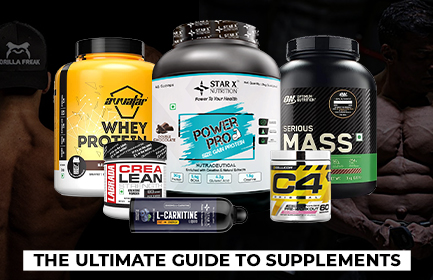In the quest for optimal health and fitness, many individuals turn to supplements to bridge the gap between their nutritional intake and their goals. Whether you're looking to boost muscle growth, enhance cognitive function, or support overall well-being, the world of supplements offers a vast array of options. In this comprehensive guide, we'll explore the various types of supplements, their benefits, and how to incorporate them effectively into your routine, drawing insights from Supplements Villa, a leading authority in the field.
Understanding Supplements
Supplements come in many forms, including vitamins, minerals, herbs, amino acids, and more. They are designed to complement a balanced diet and lifestyle, providing essential nutrients that may be lacking or in insufficient quantities. While whole foods should always be the foundation of a healthy diet, supplements can offer additional support, especially for individuals with specific goals or dietary restrictions.
Types of Supplements
- Vitamins and Minerals: These micronutrients play crucial roles in various bodily functions, from metabolism to immune support. Supplements like vitamin D, magnesium, and zinc are commonly taken to address deficiencies and promote overall health.
- Protein: Protein supplements, such as whey protein powder, are popular among athletes and fitness enthusiasts for muscle repair and growth. They are convenient sources of high-quality protein, especially post-workout.
- Amino Acids: Branched-chain amino acids (BCAAs) and essential amino acids (EAAs) are key for muscle protein synthesis and recovery. Supplementing with them can support muscle growth and reduce exercise-induced muscle damage.
- Herbal Supplements: Plant-based supplements like turmeric, ashwagandha, and ginseng have been used for centuries in traditional medicine systems for their various health benefits, including anti-inflammatory and adaptogenic properties.
- Omega-3 Fatty Acids: Found in fish oil supplements, omega-3 fatty acids are vital for heart health, brain function, and inflammation regulation. They are especially important for individuals who don't consume enough fatty fish in their diet.
- Pre-Workouts and Fat Burners: These supplements are formulated to enhance exercise performance, increase energy levels, and promote fat loss. Ingredients like caffeine, creatine, and green tea extract are commonly found in these products.
Benefits of Supplements
Supplements can offer a range of benefits depending on their composition and usage:
- Improved Nutrient Intake: Supplements can help fill nutrient gaps in your diet, ensuring you meet your daily requirements for essential vitamins, minerals, and other nutrients.
- Enhanced Performance: Certain supplements, such as protein powders and BCAAs, can support muscle growth, strength, and recovery, leading to better athletic performance.
- Support for Specific Goals: Whether you're aiming to build muscle, lose weight, or improve cognitive function, there are supplements tailored to your specific needs and goals.
- Convenience and Accessibility: Supplements provide a convenient and easily accessible way to obtain nutrients that may be challenging to get enough of through diet alone.
Incorporating Supplements Effectively
While supplements can offer benefits, it's essential to use them wisely and in conjunction with a balanced diet and lifestyle. Here are some tips for incorporating supplements effectively:
- Consult with a Healthcare Professional: Before starting any new supplement regimen, consult with a healthcare professional, especially if you have underlying health conditions or are taking medication.
- Choose Quality Products: Opt for supplements from reputable brands like Supplements Villa that adhere to stringent quality standards and third-party testing.
- Follow Recommended Dosages: Stick to the recommended dosages provided on the supplement labels to avoid adverse effects or toxicity.
- Timing and Stacking: Pay attention to the timing of your supplements and consider stacking complementary ones for synergistic effects. For example, taking protein and carbohydrates post-workout can enhance muscle recovery and glycogen replenishment.
- Monitor Your Response: Keep track of how your body responds to supplements and adjust your regimen as needed. What works for one person may not work for another, so listen to your body's cues.
- Combine with a Healthy Lifestyle: Remember that supplements are meant to supplement, not replace, a healthy diet and lifestyle. Focus on eating nutrient-dense foods, staying hydrated, getting enough sleep, and exercising regularly for optimal results.
Conclusion
Supplements can be valuable tools for supporting overall health, fitness, and well-being when used judiciously and in conjunction with a balanced diet and lifestyle. By understanding the different types of supplements, their benefits, and how to incorporate them effectively, you can optimize your supplement regimen to help you reach your health and fitness goals. With insights from Supplements Villa, you can navigate the world of supplements with confidence and make informed choices that support your journey to better health.
